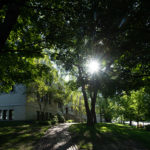
Convocation 2016: Why Are We Here?
It is my great pleasure to welcome you – students, staff and faculty – to the opening of the 2016-17 academic year. Today we begin our celebration of the 150th anniversary of the founding of The College of Wooster, 147 years from the opening of the college’s first academic year.
This particular moment, at the opening of the year, marks both a beginning and time to celebrate and reflect on what has come before. That’s true for me, as I begin my term as your president, but also for the college, as we reflect on 150 years of teaching and learning and prepare for the college’s future; in which we recommit to our core values, and work to become and even better place for all of our students to live, learn and thrive in the coming century.
Perhaps you are thinking that this sort of “beginning and ending” idea is a natural analogy for our students as well, since we have among us our beginners – the first-year students, who have attended, so far, just one single day of class, and our enders, our seniors, who have nearly completed their time at the college. But I would argue that’s not quite the case.
First-year students, you are not quite “beginners.” While you are new here, you are not blank slates, starting from nothing. You are, in fact, marvelous and whole people, who bring with you a deep history from your own families, your cultures, the learning and living you did before you came here. As I mentioned on Monday, through your time here you will not only learn, you will also teach others, and the thread of your family will be woven into the fabric of this college and into the Wooster family, the family of Scots, extending back 150 years and forward into the future.
And seniors – you are not at the end. This last year in our campus community presents remarkable opportunities. And though you will complete your I.S. and graduate in just 9 short months, you will always be a Scot, woven into the Wooster family.
Indeed, we are all here through the generosity and hard work of that Wooster family; through each Scot’s ongoing commitment to strengthen the college both as a student and as an alumnus. It is that continued engagement and generosity that allows this wonderful place to exist and to be sustained for the coming generations.
But back to the present. For both seniors and first-year students, I would argue that now- the opening of the year – is the right moment to ask this fundamental question. Why are we here? You may already be considering this in light of the fact that it is a lovely day, and you are busy people, and I seem to be intending to give advice for a long time. Fair enough (though I’ll actually be pretty brief). But the question I would like to discuss is actually another one. Why are we here — living and doing our learning together in this one small, and particular, place?
In recent years there has been a great deal of conversation about distance learning. MOOCS (Massively Open Online Courses) have been very much in the national view, with their transformative potential a subject of much speculation.
And, it’s also true that we live in difficult times both personally and nationally. The summer of 2016 has brought with it both new and terrible violence, as well as reminders of discrimination and violence that have long been present – though perhaps not seen or acknowledged by those privileged not to experience them.
This campaign season in the United States is divisive, dismissive, uncivil, and seems in many instances racist to an unprecedented degree. And, in the protected and anonymous space of social media, targeted bullying and humiliation from those we don’t know has become the norm for everyone from celebrities to elementary school children.
In this context, I would like to make a radical claim. The transformative power that is needed most at this moment is not that of additional technology, but rather the power of a recommitment to the lived, in person, face-to-face, intentional community of learners.
What does such a recommitment look like?
It looks like this: individuals with widely different experiences, identities, cultures, faiths, beliefs, abilities, appearances, sexual orientations and gender identities, living, studying and learning together. It looks like those individuals putting in the extra effort to reach out to spend time with those with whom they disagree – seeking out the opportunity to talk with those whose beliefs they may even find upsetting or offensive, and then listening to those people, not with the goal of convincing them, but rather with the goal of understanding them more fully.
It looks like individuals learning to converse about things that matter, with people with whom they don’t agree, with respect and even with kindness; allowing for the possibility that others may have a perspective that they need to hear. At The College of Wooster, we have a sacred opportunity to undertake this transformative work, and through the understanding we gain, to learn things that will empower us to act to create a more just world.
Through academic work, we can infuse these in-person conversations with not just our own experiences and views, but also with historical, political, literary and artistic perspectives from other places and times. We can learn to disagree while respecting not just one another, but also central tenets of justice, humanity and equity. We can learn to look at ourselves, to recognize our own privileges, biases and prejudices, and act to address them. We can face history, one another, and ourselves, and by doing so we can face the future and our own responsibilities with new eyes.
Seniors, you have one year left to do this. I urge you to make it your top priority. You may feel you have already found “your people” here at Wooster, the friends with whom you feel comfortable, with whom you have lived for years, and with whom a single two-word text passes along all you want to say. Do not stop there. There are people here you don’t know. There are people here from whom you can learn things that will enable you to do far more in the world. It is extremely likely that these people are not the ones with whom you agree, but those who you do not yet understand. Seek them out…. by sitting with someone new at Lowry, going to a gathering you’ve never been to, taking a class in something you know nothing about. Ask questions, and listen. Do not check your phone, and do not tweet about what the other person said after your conversation ends. They have trusted you enough to speak with you honestly, and that trust is for you, not for Facebook.
First-year students, you are building community anew, and may be feeling a bit hesitant about it. You may be wondering whether you will ever make friends here who are like your friends from home. The answer to that question is: no. You will not. You will definitely make friends here, but they will be different from your friends at home. Have no fear… the friendships you create here will be just as deep, and trusting, and loyal, protective, and nourishing, but they will be even more powerful in your life because they will have started with your own efforts – even if tentative at first – to open up to and befriend someone whose life before Wooster was very different from your own.
On Monday at the panel on the common reading, “The Other Wes Moore,” the first-year students heard Professor Rudisill quote from Bryan Stevenson’s powerful book, “Just Mercy,” in which Stevenson describes his work fighting for the rights and survival of the young people – largely low-income young people of color – in the court system. In June I had the profound honor of meeting Mr. Stevenson, and talking with him. He says this: “Our visions of technology and design… have to be married with visions of humanity, compassion and justice.”
With the commitment to talk honestly and to listen fully, to understand our own privileges and biases, to bring to bear on our decisions deep understanding of both history and the experiences of those who are here with us – we can become the people who begin to shift the hardest things about our world right now, as Mr. Stevenson has in his work as the founder of the Equal Justice Initiative.
Let me be clear – I am not saying that understanding is all that we need to create change… or that by understanding one another we automatically render justice where injustice stood before. Once you have really listened to someone, you are absolutely free to continue to disagree with them. You are free to do that firmly, and to express to them in the fullest way your concerns. You are free – indeed, you are called – to act to right injustice with every fiber of your mind, body and heart. My point is this: your ability to create profound and lasting change and your understanding of those with whom you disagree are two parts of the same whole.
President Obama said this beautifully in his eulogy for the Honorable Reverend and Senator Clementa Pinckney, who was murdered, in a hate crime, along with eight other parishoners at the Emmanuel AME church in Charleston, South Carolina last June. “Justice,” President Obama said, “grows out of our recognition of ourselves in each other.”
The Wooster community – this particular place – is filled with remarkable people with wide experience. By committing to listen to one another and learn from one another, directly, personally, and with the particular and sometimes excruciating accountability that can only come from knowing that we will all be here and facing one another – in classrooms, dining halls, offices and common rooms – the next day, and the day after that – we enable the change that we seek. It is the opposite of the anonymous commenting on social media. It is the opposite of Yik Yak. It is a two-way conversation, and it is personal.
Such listening – such recognizing of ourselves in one another – is hard. It can be uncomfortable or even painful. It requires a long-term commitment, and patience. But the benefits of doing it – and the losses we risk by failing to do so – are huge.
In his speech at the UC Berkeley commencement in 1962, President John F. Kennedy told a story of a gardener who, when asked to plant a tree, explained that it would take a hundred years to mature. The response came back, “Then there is no time to lose! We must plant that tree this afternoon.” Whether you have just one year remaining at Wooster, or whether you have four, I encourage you to make that commitment to the sacred work of listening, face to face, and with respect, empathy, and the desire to recognize yourself even in those with whom you disagree, so that you can act most powerfully for good at Wooster and in the world. Plant that tree of understanding, this afternoon – immediately – today, perhaps even as you leave the chapel and sit down for lunch. That’s why – in the end – we are here, learning in one place, together, as Scots.
Thank you.
Posted in Announcements on May 30, 2019.


